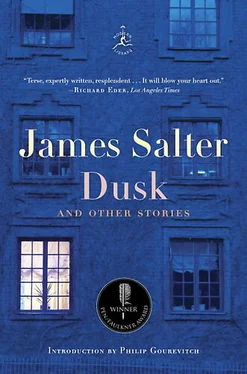Slowly he began her introduction to another world, a world which scorned exposure, a world more rich than the one she knew, certain occult books, philosophies, even music. She discovered she had a talent for it, an instinct. She achieved a kind of power over herself. There were periods of deep affection, serenity. They sat in a friend’s house and listened to Scriabin. They ate at the Russian Tea Room, the waiters knew his name. Hedges was performing an extraordinary act, he was fusing her life. He, too, had found a new existence: he was a criminal at last. At the end of a year they came to Europe.
“He’s intelligent,” she explained. “You feel it immediately. He has a mind that touches everything.”
“How long have you been with him?”
“Forever,” she said.
They walked back toward her hotel in that one, dying hour which ends the day. The trees by the river were black as stone. Wozzeck was playing at the theater to be followed by The Magic Flute . In the print shops were maps of the city and drawings of the famous bridge as it looked in Napoleon’s time. The banks were filled with newly minted coins. She was strangely silent. They stopped once, before a restaurant with a tank of fish, great speckled trout larger than a shoe lazing in green water, their mouths working slowly. Her face was visible in the glass like a woman’s on a train, indifferent, alone. Her beauty was directed toward no one. She seemed not to see him, she was lost in her thoughts. Then, coldly, without a word, her eyes met his. They did not waver. In that moment he realized she was worth everything.
They had not had an easy time. Reason is unequal to man’s problems, Hedges said. His wife had somehow gotten hold of his bank account, not that it was much, but she had a nose like a ferret, she found other earnings that might have come his way. Further, he was sure his letters to his children were not being delivered. He had to write them at school and in care of friends.
The question above all and always, however, was money. It was crushing them. He wrote articles but they were hard to sell, he was no good at anything topical. He did a piece about Giacometti with many haunting quotations which were entirely invented. He tried everything. Meanwhile, on every side it seemed, young men were writing film scripts or selling things for enormous sums.
Hedges was alone. The men his age had made their reputations, everything was passing him by. Anyway he often felt it. He knew the lives of Cervantes, Stendhal, Italo Svevo but none of them was as improbable as his own. And wherever they went there were his notebooks and papers to carry. Nothing is heavier than paper.
In Grasse he had trouble with his teeth, something went bad in the roots of old repairs. He was in misery, they had to pay a French dentist almost every penny they had. In Venice he was bitten by a cat. A terrible infection developed, his arm swelled to twice its size, it seemed the skin would burst. The cameriera told them cats had venom in their mouth like snakes, the same thing had happened to her son. The bites were always deep, she said, the poison entered the blood. Hedges was in agony, he could not sleep. It would have been much worse fifty years ago, the doctor told them. He touched a point up near his shoulder. Hedges was too weak to ask what it meant. Twice a day a woman came with a hypodermic in a battered tin box and gave him shots. He was growing more feverish. He could no longer read. He wanted to dictate some final things, Nadine took them down. He insisted on being buried with her photograph over his heart, he had made her promise to tear it from her passport.
“How will I get home?” she had asked.
Beneath them in the sunlight the great river flowed, almost without a sound. The lives of artists seem beautiful at last, even the terrible arguments about money, the nights there is nothing to do. Besides, through it all, Hedges was never helpless. He lived one life and imagined ten others, he could always find refuge in one of them.
“But I’m tired of it,” she confessed. “He’s selfish. He’s a child.”
She did not look like a woman who had suffered. Her clothes were silky. Her teeth were white. On the far pathways couples were having lunch, the girls with their shoes off, their feet slanting down the bank. They were throwing bits of bread in the water.
The development of the individual had reached its apogee, Hedges believed, that was the essence of our time. A new direction must be found. He did not believe in collectivism, however. That was a blind road. He wasn’t certain yet of what the path would be. His writing would reveal it, but he was working against time, against a tide of events, he was in exile, like Trotsky. Unfortunately, there was no one to kill him. It didn’t matter, his teeth would do it in the end, he said.
Nadine was staring into the water.
“There are nothing but eels down there,” she said.
He followed her gaze. The surface was impenetrable. He tried to find a single, black shadow betrayed by its grace.
“When the time comes to mate,” she told him, “they go to the sea.”
She watched the water. When the time came they heard somehow, they slithered across meadows in the morning, shining like dew. She was fourteen years old, she told him, when her mother took her favorite doll down to the river and threw it in, the days of being a young girl were over.
“What shall I throw in?” he asked.
She seemed not to hear. Then she looked up.
“Do you mean that?” she finally said.
She wanted them to have dinner together, would Hedges sense something or not? He tried not to think about it or allow himself to be alarmed. There were scenes in every literature of this moment, but still he could not imagine what it would be like. A great writer might say, I know I cannot keep her, but would he dare give her up? Hedges, his teeth filled with cavities and all the years lying on top of his unwritten works?
“I owe him so much,” she had said.
Still, it was difficult to face the evening calmly. By five o’clock he was in a state of nerves, playing solitaire in his room, rereading articles in the paper. It seemed that he had forgotten how to speak about things, he was conscious of his facial expressions, nothing he did seemed natural. The person he had been had somehow vanished, it was impossible to create another. Everything was impossible, he imagined a dinner at which he would be humiliated, deceived.
At seven o’clock, afraid the telephone would ring at any moment, he went down in the elevator. The glimpse of himself in the mirror reassured him, he seemed ordinary, he seemed calm. He touched his hair. His heart was thundering. He looked at himself again. The door slid open. He stepped out, half expecting to find them there. There was no one. He turned the pages of the Zurich paper while keeping an eye on the door. Finally he managed to sit in one of the chairs. It was awkward. He moved. It was seven-ten. Twenty minutes later an old Citroën backed straight into the grill of a Mercedes parked in the street with a great smashing of glass. The concierge and desk clerk went running out. There were pieces everywhere. The driver of the Citroën was opening his door.
“Oh, Christ,” he murmured, looking around.
It was William Hedges. Alone.
They all began to talk at once. The owner of the Mercedes, which was blinded, fortunately was not present. A policeman was making his way along the street.
“Well, it’s not too serious,” Hedges said. He was inspecting his own car. The taillights were shattered. There was a dent in the trunk.
After much discussion he was finally allowed to enter the hotel. He was wearing a striped cotton jacket and a shirt the color of ink. He had a white face, damp with sweat, the face of an unpopular schoolboy, high forehead, thinning hair, a soft beard touched with gray, the beard of an explorer, a man who washed his socks in the Amazon.
Читать дальше












